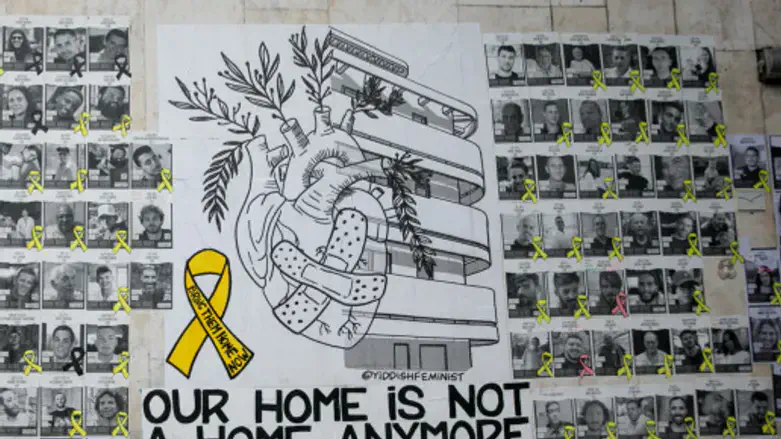
The Medical Directorate of the Israel Ministry of Health sent a report on the starvation, sexual abuse, and beating of children while being held in Hamas captivity to the Special Rapporteur on torture and other cruel, inhuman or degrading treatment or punishment in the United Nations, documenting widespread abuse of returned hostages, including sexual abuse, beatings, starvation, and isolation.
Hostages who returned from Hamas captivity in Gaza suffered from a myriad of medical and psychological conditions as a result of their imprisonment, with many enduring starvation, sexual abuse, beatings, and more.
The personnel who treated the hostages after their return to Israel reported the abuse suffered by the hostages and its impact on their physical and mental health.
The Health Ministry also detailed several successful rehabilitation stories based on information collected from professionals who have been providing ongoing care to the returned hostages.
According to the report, women, men, and children who returned from captivity were subjected to a variety of abuses, including beatings, isolation, deprivation of food and water, branding, hair-pulling, sexual assault and forcing them to undress.
The hostages were denied medical treatment for acute injuries caused during the October 7th massacre, and fractures, shrapnel wounds, and burns were treated inadequately, leading to complications which required additional surgeries, that could have been prevented with appropriate care.
Many hostages were subjected to torture when their captors performed painful procedures without anesthesia or withheld needed medical attention. At least one hostage is believed to have died from untreated medical complications.
Several older returned hostages developed Deep Venous Thrombosis (DVT), which, if not treated properly, can be fatal.
In addition to starvation, the returned hostages reported that the food and water they had access to were of poor quality, causing multiple cases of malnutrition and illness, including Sarcopenia, Refeeding Syndrome, weight loss and other disorders.
The report also noted that doctors who treated the hostages expressed concern that the released children may suffer long-term developmental and growth effects.
The returned hostages reportedly lost an average of 10-17% of their body weight and in extreme cases, children lost up to 18% of their body weight, requiring some of them to receive intensive care treatment upon return.
The poor quality of food and water, combined with unsanitary conditions, led to increased morbidity among the hostages. Many suffered from intestinal complications. They had limited access to showers and developed skin infections, including dermatitis.
Most released hostages returned home to find that their families had been murdered by Hamas terrorists and their homes had been destroyed, so many of them had no one to turn to for support during their recovery.
The captivity was designed to torture the hostages psychologically and was marked by intense trauma: family separation, immobilization, arbitrary and frequent transfers, and exposure to further violence. Some hostages witnessed the killing of other hostages. The captivity was designed to torture the hostages psychologically, break their morale, and make them easier to control.
Their time in captivity was marked by intense trauma, including family separation, immobilization, arbitrary and frequent transfers, and exposure to further violence.
The hostages also reported suffering from severe nightmares, along with sleep deprivation, as they attempted to avoid recurring nightmares.
Many reported experiencing derealization, struggling to accept that they weren't suffering from hallucinations or dreams in captivity.
Some hostages have been suffering from survivor’s guilt, feeling responsible for being rescued while their loved ones remain in Gaza, and many have avoided opening up about their experiences due to fear of retaliation by the terrorist organization against their family members still held captive.
Long-term studies of Israeli prisoners of war over thirty-five years have shown that many of the returned hostages are at high risk for Delayed-Onset Stress Disorder (PTSD), i.e. treatment will be required even years after release.
The ages, names, and genders of children have been hidden to protect their anonymity.
Two children reported that they were bound together and beaten throughout their captivity, and two additional children were found with burn marks on their lower limbs.
Two teenage hostages described how they were made to perform sexual acts on each other.
Many hostages of all ages and genders described undergoing sexual abuse at the hands of their captors, including a woman who was assaulted at gunpoint by a Hamas terrorist.
“The shocking testimonies from released hostages paint a grim reality: physical abuse, psychological torment, and dehumanizing conditions were inflicted on innocent people, some young children and other elder people and grandparents, for more than fifty excruciating days,” the Hostages and Missing Families Forum Headquarters said in a statement following the release of the report.
“To the world, its leaders, and humanitarian organizations: How can you watch this torture continue? How can you remain silent? The truth cannot be denied - every hostage faces immense danger every day that they remain in captivity," the report added.
"This critical report underscores the urgent need to release all hostages immediately,” Moshe Bar-Siman-Tov, Director General of the Health Ministry, said.
"It is both a responsibility and a privilege for us to provide optimal medical care and support for those who were brutally kidnapped by Hamas terrorists and returned home," Bar-Siman-Tov added. "We are hopeful for the return of all hostages—the living for treatment and rehabilitation, and the deceased for a dignified burial in Israel."
“Not a day passes without us thinking of the immense hardships that those who have returned are facing and as well as those who are still held in captivity,” Dr. Hagar Mizrahi, head of the Health Ministry’s medical directorate, said.
“The severe physical and mental conditions of the returned hostages offer the world a glimpse into the horrific atrocities committed by Hamas," he added.
